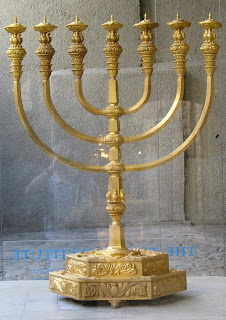
There is a well known disagreement, or possible confusion, about what the true miracle of Channukah is. Most people are familiar with the story of Channukah regarding the miracle of one jar of oil burning for eight whole days. This story can be found in Massechet Shabbat (21b). However there is also the additional prayer that we add to the Amidah and Birkat HaMazon ,
על הנסים, which does not mention the miracle of the oil at all. Rather this additional prayer focuses on the other miracle that happened during Channukah, the miracle of the military victory against the Greeks. The question that can be debated ad nauseum in Yeshivot is: which is the true miracle of Channukah, the oil or the military victory. (In Yeshiva-speak it would sound like: Which is the ikkar -
נס פח השמן או נס מלחמה?)
In true Modern Kabbalistic Chassidic (and even possibly post-modern) style, this is not a disagreement (
מחלוקת) that is meant to be resolved. The tension between the two miracles reflects two fundamentally different approaches to describe how HaShem interacts with the world. The miracle of the oil is an obvious miracle which contradicts the laws of nature. It is scientifically impossible for one jar of oil to burn for eight days. This type of obvious miracle is called a
nes galui (
נס גלוי). The miracle of the military victory is a hidden miracle (
נס נסתר) - although it is improbable for a small band of Maccabees to defeat the might of the Greek army, it is scientifically possible. See my
blog post for a discussion of the Ramban's explanation of hidden miracles (
נסים נסתרים).
Now let us return to the question of why does the additional prayer (
על הנסים) only mention the hidden miracle of the military victory? I would suggest that Chazal felt that it is only appropriate to daven for hidden miracles. There is a Rabbinic aphorism -
על תסמול על הנס, do not rely on miracles. When we ask for help from HaShem we should not ask for outright miracles that contradict the laws nature.
For example, let me describe three approaches to getting a million dollars. The first approach is an obvious miracle - a million dollars suddenly appears on my doorstep. The second approach is a highly improbable hidden miracle - to win a million dollars in the lottery. The third approach is a common hidden miracle - to start a business and earn a million dollars. The military victory of Channukah would be in between approaches two and three - not as improbable as winning the lottery and not as likely earning a million dollars with a successful business. Channukah teaches us that it is only appropriate to daven for a hidden miracle that is similar to military victory of the Maccabees. Whereas, we commemorate the obvious miracles, like the jar of oil, with a different type of religious ritual or mitzvah.
 I was learning a Mishnah the other day and came across an interesting piece of Talmudic realia.
I was learning a Mishnah the other day and came across an interesting piece of Talmudic realia.





